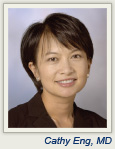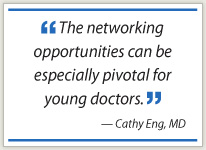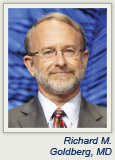Gastrointestinal cancers are a key therapeutic area in research, and science is moving forward in that arena at a fast clip. But how are those who focus on gastrointestinal malignancies in the clinic supposed to stay on top of it all?
One great way is to attend the annual Gastrointestinal Cancers Symposium, which will take place January 19-21 in San Francisco.
The symposium—attended last year by 2,850 residents, post-docs, fellows, and all levels of faculty and private practitioners—offers a vast array of educational sessions and abstract presentations focused on GI cancers.
 “The whole point of this meeting is to take what is happening in current research, understand it, and if appropriate apply it to the clinical setting,” said Cathy Eng, MD, Scientific Program Chair of the symposium. “My goals are to provide a well-developed, well-rounded program to provide fundamental knowledge in translational research, identify novel clinical findings, and/or discuss aspects of recent clinical trials in development.” Dr. Eng, who is Associate Professor and Associate Director of the Colorectal Center at the University of Texas MD Anderson Cancer Center Department of Gastrointestinal Medical Oncology.
“The whole point of this meeting is to take what is happening in current research, understand it, and if appropriate apply it to the clinical setting,” said Cathy Eng, MD, Scientific Program Chair of the symposium. “My goals are to provide a well-developed, well-rounded program to provide fundamental knowledge in translational research, identify novel clinical findings, and/or discuss aspects of recent clinical trials in development.” Dr. Eng, who is Associate Professor and Associate Director of the Colorectal Center at the University of Texas MD Anderson Cancer Center Department of Gastrointestinal Medical Oncology.
Truly Multidisciplinary
The 3-day meeting is the largest multidisciplinary GI-focused gathering in the United States. ASCO, the American Gastroenterological Association, the American Society for Radiation Oncology, and the Society of Surgical Oncology all cosponsor the meeting.
“There is no other GI meeting like this one,” commented Richard M. Goldberg, MD, Chair of the symposium’s steering committee. “Sponsorship by so many academic societies whose specialists provide clinical management for patients with GI cancer and do research to advance the field means that the agenda reflects the latest advances and hot topics in the field.” Dr. Goldberg is Associate Director of Clinical Research for the University of North Carolina’s Lineberger Comprehensive Cancer Center and Physician-in-Chief of the N.C. Cancer Hospital.
Helping Initiate More Research
 While the meeting helps physicians keep updated on research and advance their own knowledge base, it also generates ideas for more research. In addition to the sessions themselves, much is gained from the symposium’s networking opportunities. Dr. Eng said that the ability to interact and network with colleagues to generate novel ideas for future research proposals has drawn her to the symposium year after year.
While the meeting helps physicians keep updated on research and advance their own knowledge base, it also generates ideas for more research. In addition to the sessions themselves, much is gained from the symposium’s networking opportunities. Dr. Eng said that the ability to interact and network with colleagues to generate novel ideas for future research proposals has drawn her to the symposium year after year.
“The networking opportunities can be especially pivotal for young doctors,” Dr. Eng pointed out. “We hold a mentoring luncheon on the first day for the fellows and junior faculty so they can directly interact in small groups with leading experts in their field. This year, I have invited 12 of the world’s leading experts in GI malignancies, including ones from radiation oncology, medical oncology, and surgical oncology. Though it may seem short, this 1 hour can help individuals resolve questions about faculty development and potentially develop long-lasting relationships with a mentor from another institution.”
Large, Yet Intimate
 The focused agenda and the opportunity for participants to interact with the world’s experts in GI cancer have led to growth in attendance every year. Though the numbers of attendees have been growing, the symposium is small enough to feel intimate, and this is key, Dr. Goldberg noted.
The focused agenda and the opportunity for participants to interact with the world’s experts in GI cancer have led to growth in attendance every year. Though the numbers of attendees have been growing, the symposium is small enough to feel intimate, and this is key, Dr. Goldberg noted.
“For clinicians and trainees, the program provides a concentrated immersion in GI cancer patient management and emerging findings in translational science that is much more user friendly than the large general oncology meetings that occur in the U.S. and elsewhere.”
For more details on the GI Symposium or to register, visit gicasym.org ■.
© 2011. American Society of Clinical Oncology. All rights reserved.

